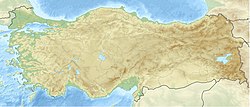Top Qs
Timeline
Chat
Perspective
Antigonia (Syria)
Ancient Greek city in the Seleucid Empire From Wikipedia, the free encyclopedia
Remove ads
Antigonia (Greek: Αντιγόνεια) also transliterated as Antigonea and Antigoneia was a Hellenistic city in Seleucid Empire, Syria (in modern Turkey), on the Orontes, founded by Antigonus I Monophthalmus in 307 BC, and intended to be the capital of his empire; the site is approximately 7 km northeast of Antakya, Hatay Province, Turkey. After the Battle of Ipsus, 301 BC, in which Antigonus perished, the inhabitants of Antigonia were removed by his successful rival Seleucus I Nicator to the city of Antioch, which Seleucus founded a little lower down the river. (Strabo xvi. p. 750; Diod. xx. 47; Liban. Antioch. p. 349; Malalas, p. 256.) Diodorus erroneously says that the inhabitants were removed to Seleucia Pieria. Antigonia continued, however, to exist, and is mentioned in the war with the Parthians after the defeat of Crassus. (Dion Cass. xl. 29.)
According to Malalas, Seleucus built a shrine to Tyche in the city; Demetrius I of Macedon later moved the statue of Tyche from this shrine to Arsuz.[1]
Remove ads
References
External links
Wikiwand - on
Seamless Wikipedia browsing. On steroids.
Remove ads
